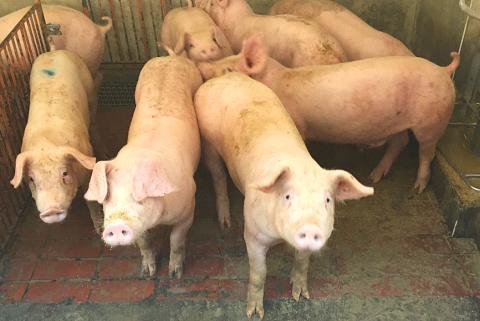A nationwide drill simulating an African swine fever (ASF) outbreak on Wednesday showed why local governments should stage similar drills in one month, the Council of Agriculture (COA) said yesterday, calling on officials and the public not to let their guard down during the New Year’s holiday starting today.
Since China reported its first infection in August, the government has increased fines for illegal meat imports, expanded quarantine measures, set up a central emergency operations center and held simulations of disposal of dead pigs in case of a local outbreak.
The Wednesday drill showed that many officials, especially younger ones, were not familiar with emergency disposal procedures, given that it has been 21 years since similar drills were held for foot-and-mouth disease, COA Deputy Minister Huang Chin-cheng (黃金城) said.

Photo courtesy of Hsinchu County Livestock Disease Control Center.
Local governments should push hog farms to adopt the required quarantine measures, such as disinfecting leftovers used to feed pigs and regulating the movement of personnel, vehicles and animals, he said.
Local governments should also plan how to dispose of dead pigs in the event of an outbreak — burying or burning them to prevent the fever from spreading, he added.
The central emergency authority was established on Dec. 18 and local governments could set up similar centers, as Yunlin, Chiayi and Pingtung counties have already done, Huang said.
Yunlin County Commissioner Chang Li-shan (張麗善) on Tuesday announced that the county would bar farmers from feeding pigs leftovers.
The move drew criticism from Premier William Lai (賴清德), who on Thursday said it might complicate kitchen waste disposal.
Asked to comment on Chang’s policy, Huang said that the county should process its own leftovers and avoid further burdening incinerators at other municipalities.
Instead of an immediate ban, the council advises disinfecting leftovers or switching to fodder, Huang added.
The council on Monday announced that it would subsidize farmers who switch to fodder or stop raising pigs.
The Legislative Yuan yesterday passed an amendment to the Act for Control of Infectious Animal Disease (動物傳染病防治條例) prohibiting the import of any meat product by mail.
The amendment says that goods subject to inspection may not enter the nation through any type of mail.
Post items found in contravention of the rule would be returned, confiscated or destroyed, it says.
Democratic Progressive Party Legislator Chiu Yi-ying (邱議瑩), who sponsored the amendment, said that since the World Organization for Animal Health in May last year declared the nation free of foot-and-mouth disease, the government has been making every effort to keep swine diseases at bay.
However, China, where ASF broke out, might be plotting to “drag Taiwan in,” as mail deliveries from China to Taiwan surged by 21 percent last month alone, Chiu said.
By withholding information on the Chinese outbreak, Beijing has unilaterally breached the Cross-Strait Arrangement on Cooperation of Agricultural Product Quarantine and Inspection (海峽兩岸農產品檢疫檢驗合作協議), she said.
China’s Taiwan Affairs Office on Wednesday said it is not obliged to inform Taipei of developments in the outbreak, as neither pork nor swine diseases are covered by the agreement.
The agreement served as the basis for cross-strait exchange of information on inspection results for produce, meat products and seafood from March 2010 until the ASF outbreak.

DEFENSE: The National Security Bureau promised to expand communication and intelligence cooperation with global partners and enhance its strategic analytical skills China has not only increased military exercises and “gray zone” tactics against Taiwan this year, but also continues to recruit military personnel for espionage, the National Security Bureau (NSB) said yesterday in a report to the Legislative Yuan. The bureau submitted the report ahead of NSB Director-General Tsai Ming-yen’s (蔡明彥) appearance before the Foreign and National Defense Committee today. Last year, the Chinese People’s Liberation Army (PLA) conducted “Joint Sword-2024A and B” military exercises targeting Taiwan and carried out 40 combat readiness patrols, the bureau said. In addition, Chinese military aircraft entered Taiwan’s airspace 3,070 times last year, up about

A magnitude 4.3 earthquake struck eastern Taiwan's Hualien County at 8:31am today, according to the Central Weather Administration (CWA). The epicenter of the temblor was located in Hualien County, about 70.3 kilometers south southwest of Hualien County Hall, at a depth of 23.2km, according to the administration. There were no immediate reports of damage resulting from the quake. The earthquake's intensity, which gauges the actual effect of a temblor, was highest in Taitung County, where it measured 3 on Taiwan's 7-tier intensity scale. The quake also measured an intensity of 2 in Hualien and Nantou counties, the CWA said.

The Overseas Community Affairs Council (OCAC) yesterday announced a fundraising campaign to support survivors of the magnitude 7.7 earthquake that struck Myanmar on March 28, with two prayer events scheduled in Taipei and Taichung later this week. “While initial rescue operations have concluded [in Myanmar], many survivors are now facing increasingly difficult living conditions,” OCAC Minister Hsu Chia-ching (徐佳青) told a news conference in Taipei. The fundraising campaign, which runs through May 31, is focused on supporting the reconstruction of damaged overseas compatriot schools, assisting students from Myanmar in Taiwan, and providing essential items, such as drinking water, food and medical supplies,

New Party Deputy Secretary-General You Chih-pin (游智彬) this morning went to the National Immigration Agency (NIA) to “turn himself in” after being notified that he had failed to provide proof of having renounced his Chinese household registration. He was one of more than 10,000 naturalized Taiwanese citizens from China who were informed by the NIA that their Taiwanese citizenship might be revoked if they fail to provide the proof in three months, people familiar with the matter said. You said he has proof that he had renounced his Chinese household registration and demanded the NIA provide proof that he still had Chinese